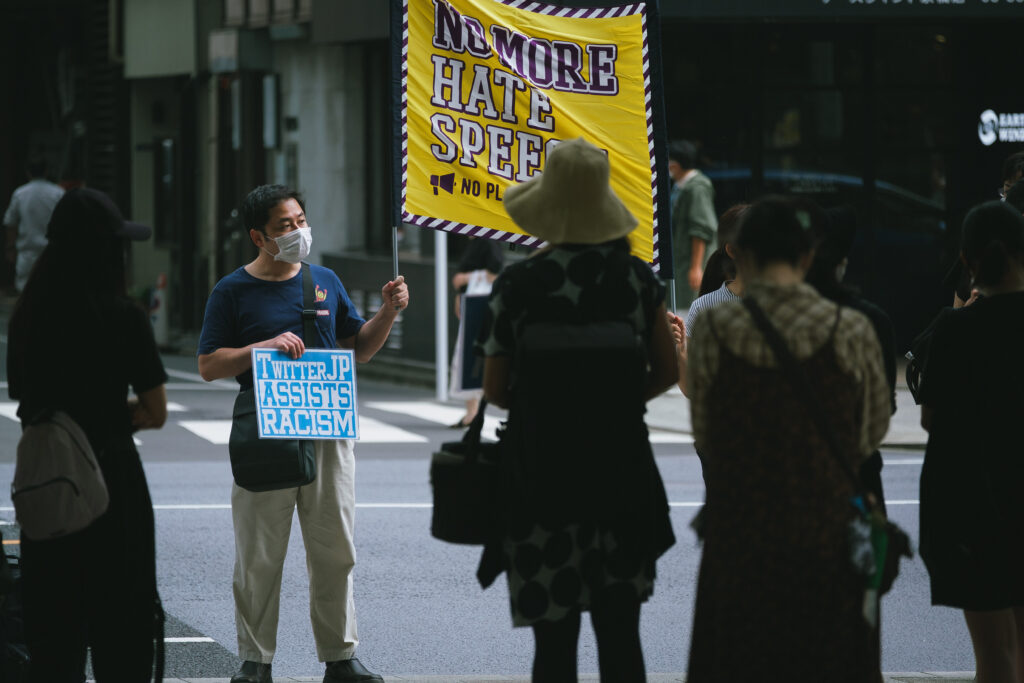In accordance with the United Nations International Convention on the Elimination of All Forms of Racial Discrimination, the Japanese Diet passed a law banning hate speech in 2016. But despite years of advocacy calling for stricter regulation, the Hate Speech Act still lacks specific penalties for those who commit hateful acts or speech.
There are several reasons for this. Legal concerns remain that such penalties would restrict freedom of expression, as does a lack of awareness of the rights of minorities. But more importantly, the law remains vague on what constitutes ‘hate speech’. The two cases in which the Supreme Court of Japan recognised the existence of hate speech both involved expressions such as ‘kill’ and ‘throw them out of Japan’ — directed at ethnic Koreans living in Japan.
Japan’s Hate Speech Act has evolved in a political culture prone to denial and revisionism. For example, former prime minister Shinzo Abe’s 2007 overt denial that ‘comfort women’ were forced into sexual slavery by the Japanese military and assertion that there was no evidence to support such claims, were seen in Japan as just one historical interpretation.
The same was true when Mayor of Nagoya Takashi Kawamura told a delegation from the Chinese city of Nanjing in 2012 that there was no Nanjing Massacre in 1937. Despite much domestic and international controversy, the 2016 Hate Speech Act remains vague in its definition of hate speech.
While not the only ethnic group targeted, high-profile cases of discrimination against Zainichi Koreans in the 2000s were central to the push for stricter regulation of hate speech in Japan. This was due to fear caused by the Association of Citizens against the Special Privileges of the Zainichi — also known as Zaitokukai — a far-right extremist political group in Japan that calls for the end of alleged privileges afforded to the Zainichi Koreans. Since its founding in 2007, Zaitokukai protests have targeted Zainichi Korean schools and occurred in residential areas in Japan that have large ethnic Korean populations.
To remedy the lack of penalties in the 2016 law, local governments have taken a more progressive approach by including penalties and other provisions in local ordinances. Osaka’s ordinance, for example, requires that the ‘name or title’ of a person who engages in ‘hate speech-like acts’ be made public. In 2022, the Supreme Court of Japan concluded that while publicising the name of someone committing hate speech can restrict freedom of expression, the ordinance was constitutional. This is because it was ‘limited to extremely malicious discriminatory speech and behaviour’ and there was a ‘strong need to deter’ hate speech.
The first city in Japan to enact an ordinance with a fine of up to 500,000 yen (US$3200) was Kawasaki. Yet since this ordinance’s enactment, local hate speech activists have reportedly moved their activities out of the city. Hate speech remains a visible problem, and in early 2024, reported cases of hate speech in Kawasaki reached an all-time high. In Kawaguchi, north of Tokyo, protests against the city’s Kurdish community have escalated.
But the legal debate in Japan is shifting, albeit slowly. A case in point is the warning issued by the Osaka Legal Affairs Bureau to Liberal Democratic Party lower house lawmaker Mio Sugita. The bureau issued its warning in response to Sugita’s 2016 blog post, in which she described Ainu and ethnic Korean women dressed in traditional costumes as partaking in ‘cosplay’.
While this is an important first step, a national debate needs to occur to ensure stricter regulation of hate speech. By default, this will involve a critical legal and political debate that recalibrates the balance between freedom of expression and hate speech.
Other countries may serve as models from which Japan can learn. The United States favours freedom of expression, while many European countries tend to regulate hate speech. In the United States, near-absolute free speech is seen as essential to democracy, and is constitutionally enshrined under the First Amendment. In contrast, in many European countries, hate speech is seen as a threat to democracy — and therefore needs to be regulated.
The French Gayssot Act, enacted in 1990, serves as an effective model for regulating hate speech. French courts and the European Court of Human Rights have ruled that negating crimes against humanity constitutes discrimination, though the French Court of Cassation does not consider historical revisionism to be hate speech. Constitutional scholars in Japan have long favoured the United States’ approach.
Yet in the face of growing criticism for unchecked hate speech, Japan is gradually moving towards a more European attitude, with the 2016 law being a critical juncture on this path. During this transition, Japan’s laws remain largely ineffective, as the national government continues to pass responsibility for eliminating hate speech to local governments while failing to promote a coherent national approach.
Despite the 2016 Hate Speech Act, Japan’s current legal framework remains inadequate. As the Kawasaki ordinance shows, punishment is not a perfect solution. Instead, Japan should follow the European path and broaden the definition of hate speech as the basis for an effective legal approach.
Junko Ito is a Senior Lecturer in Constitutional Law at the College of Humanities and Social Sciences, Ibaraki University.


Leave a Reply